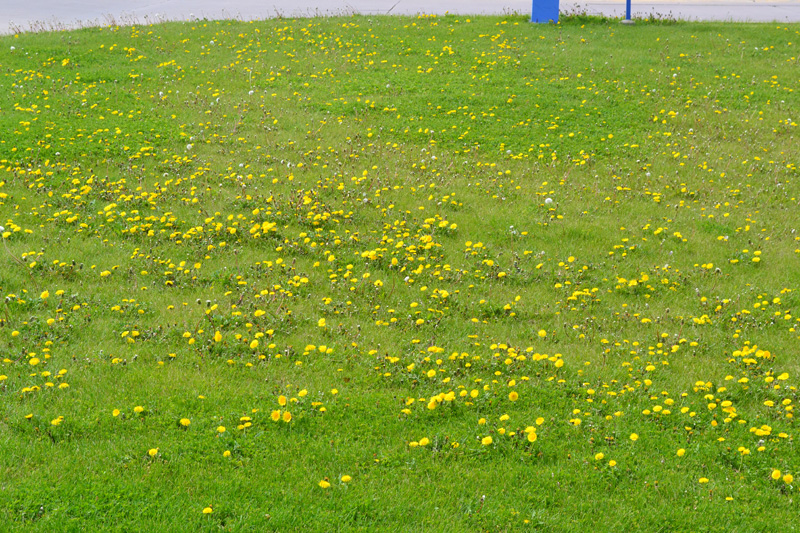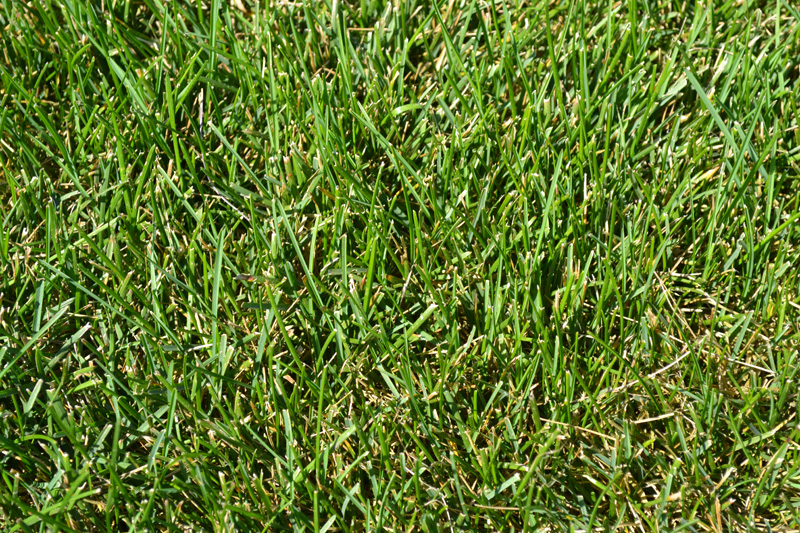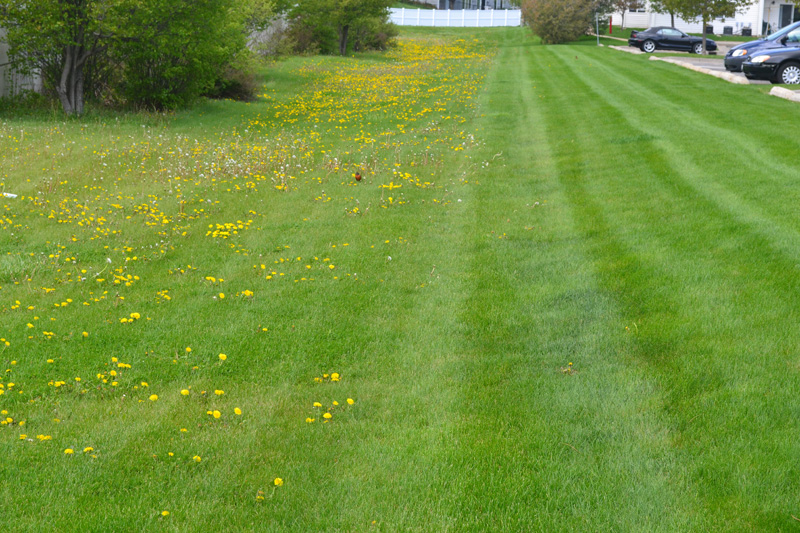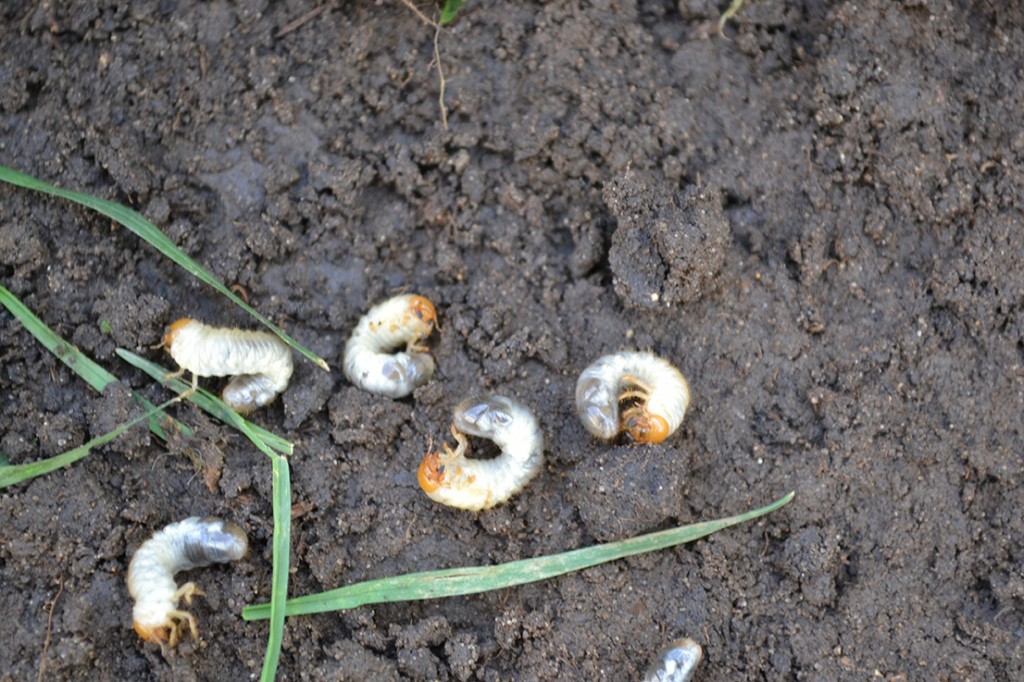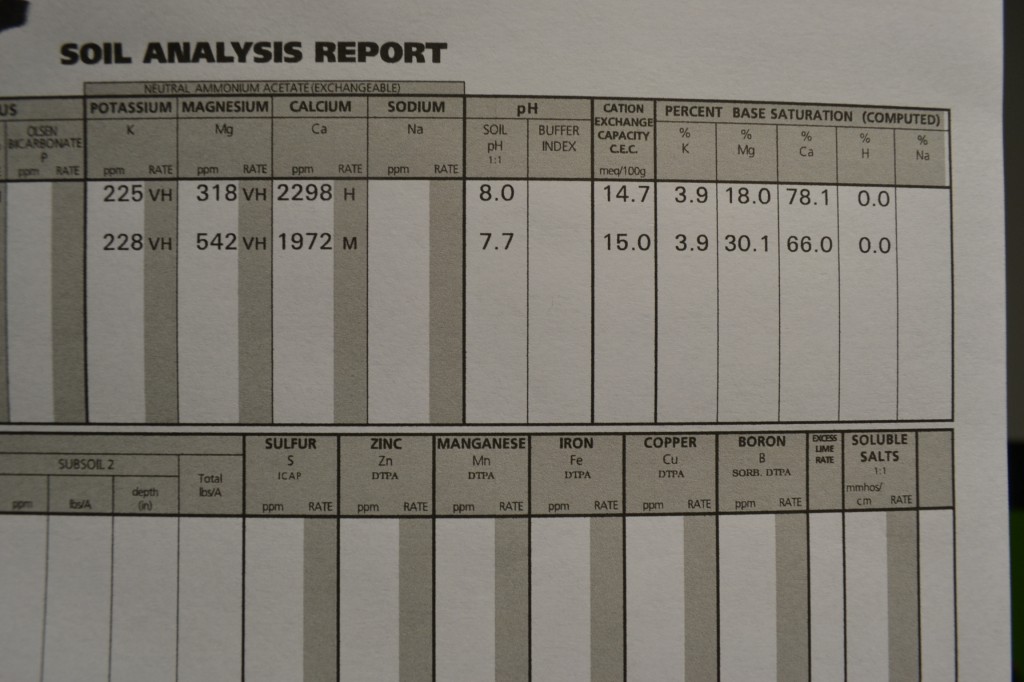One of the most critical factors in a healthy lawn is proper fertilization. Over-fertilizing or under fertilizing can weaken the turf and allow for more weeds to grow. A professional lawn company will provide the appropriate amount of fertilizer at the proper time to maximize results.
Most states require pesticide applicators to be licensed to provide fertilizing and weed control services. If you check with your local extension office or state department of agriculture, you can verify that the company treating your property is adequately licensed. Along with most licensing requirements, companies are required to take continuing education classes to maintain a valid license. These courses provide ongoing training.
Environmentally conscious companies practice (IPM) Integrated Pest Management to reduce the use of chemicals. Pesticides are only used when needed. Spot treating minimizes the volume of chemicals used on your property and yields the same results.
If your lawn looks like this, then you need to call a professional.
A carefully thought out program will give you a weed free lawn.
Most companies offer three, four, and five step application programs that are custom designed to provide maximum results for their customers. Broadleaf weed control applications should be liquid for more accurate control.
There are two primary fertilizer products used by lawn care companies. The first product is stabilized nitrogen fertilizer. Stabilized nitrogen fertilizer offers optimal results by breaking down slower than other products in the market. Programs using stabilized nitrogen also help reduce runoff and leaching. Stabilized nitrogen provides a safer, more environmentally friendly way of fertilizing your lawn. Using granular fertilizer allows the applicator to custom tailor your program to fit the specific needs of your yard. Many lawn care companies carry various fertilizer formulations so that they can customize each program to meet your lawn precisely. National chains tend to use one primary liquid formula for every yard. This reason is why you see the same low-quality results every time.
The second fertilizer product used by professional companies contains Sulfur Coated Urea (SCU). SCU is a slow release fertilizer product. Unlike Stabilized Nitrogen where the entire pearl is infused with the slow release product, SCU is a coating. Once the slow release coating on SCU is gone, the product begins to break down faster. Most fertilizer blends sold in big box stores contain SCU. The product does well by providing nutrients at a more cost-effective price point. Stabilized Nitrogen is a premium product and does cost more to apply.
A quality company will sell you a superior lawn application which will provide excellent color, increased turf density and greater root development not just a fertilizing application. Quality products are easily identifiable because they work and keep on working from one application to the next making your lawn thick and giving it a beautiful green color.
Treated and untreated side by side. See the huge difference?
BASIC FERTILIZER AND WEED CONTROL PROGRAM
– Early Spring Application
An early application should consist of pre-emergent crabgrass, yellow foxtail and goosegrass control plus granular fertilizer.
– Late Spring Application
A late spring application should consist of liquid broadleaf weed control. Since the plant must absorb most broadleaf weed control products, liquid weed control must be used. Granular broadleaf weed control products are not effective.
– Summer Application
A summer application should consist of granular fertilizer and spot treatment of broadleaf weeds. Slow release fertilizer products are recommended at this time of year to reduce turf burn.
– Early Fall Application
A late spring application should consist of liquid broadleaf weed control. Since the plant must absorb most broadleaf weed control products, liquid weed control must be used. Granular broadleaf weed control products are not effective.
– Late Fall Application
A late fall application consists of a winterizer granular fertilizer and spot treatment of broadleaf weeds. Choose a product that will provide the nutrients necessary to feed the grass plant over the winter.
ADDING CALCIUM TO YOUR PROGRAM
Applying calcium twice a year to your lawn care program will enhance the performance of fertilizing. Calcium is used to help reduce soil compaction by breaking down clay in the ground. Minimizing the presence of clay allows grass roots to grow deeper and expand further. The more abundant the root system of your grass plant, the easier it is for your plant to uptake water and nutrients.
If you look at a newly established lawn in the middle of summer, more than likely it will start to dry out with a lack of rain. Comparatively speaking, if you take a look at a lawn in an older established neighborhood, the grass will tend to stay greener longer during this same period. Upon making a soil probe of your turf, you will more than likely see a higher volume of clay in the new lawn. The established yard will have richer soil at a deeper depth, and the root system of the plant will be far superior.
INSECT CONTROL
Trained Applicators can identify diseases, fungus, and insects in the turf and properly advise you on how to rid the pest and help your lawn recover.
Most lawn care companies offer a grub preventive application to stop turf damaging insects before they become a problem. These products are applied in early summer to minimize grub damage to your lawn. Stopping grubs with a preventive application will eliminate the need for unnecessary lawn repairs due to grub damage. There are also curative applications to control insect and fungus problems as they arise in your turf.
SOIL SAMPLES
Soil samples are the best way look at the in-depth analysis of the soil structure including finding out what the pH is. The pH of your soil is one of the leading contributing factors in an unhealthy lawn. Most lawns should have a pH of 7. Having a low or a high soil pH will visibly show signs of an imbalance in your yard. Getting a soil sample analysis done will inform you of nutrient deficiencies or abundances present in your lawn. Program adjustments should be made based on the results of the samples. Sometimes it is necessary to amend the soil with a lime or gypsum application based on the pH level in your lawn. Other times micronutrients must be added to your fertilizer program to correct any underlying issues.

